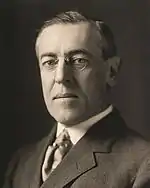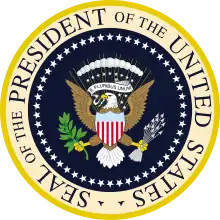Wilsonianism
Wilsonianism or Wilsonian idealism describes a certain type of foreign policy advice. The term comes from the ideas and proposals of President Woodrow Wilson (1913–1921). He issued his famous Fourteen Points in January 1918 as a basis for ending World War I and promoting world peace. He was a leading advocate of the League of Nations to enable the international community to avoid wars and end hostile aggression. Wilsonianism is a form of liberal internationalism.[1]
Principles
Common principles that are often associated with "Wilsonianism" include:
- Emphasis on self-determination of peoples;[2][3] and advocacy of the spread of democracy.[4] Anne-Marie Slaughter writes that Wilson expected and hoped "that democracy would result from self-determination, but he never sought to spread democracy directly."[5] Slaughter similarly writes that Wilson's League of Nations was similarly intended to foster liberty democracy by serving as "a high wall behind which nations" (especially small nations) "could exercise their right of self determination" but that Wilson did not envision that the U.S. would affirmatively intervene to "direct" or "shape" democracies in foreign nations.[5]
- Advocacy of the spread of capitalism[6]
- Support for collective security, and least partial opposition to American isolationism.[7]
- Support for multilateralism through collective deliberation among nations[5]
- Support for open diplomacy and opposition to secret treaties[7][8]
- Support for freedom of navigation and freedom of the seas[7][9]
Historian Joan Hoff writes, "What is 'normal' Wilsonianism remains contested today. For some, it is 'inspiring liberal internationalism' based on adherence to self-determination; for others, Wilsonianism is the exemplar of humanitarian intervention around the world,' making U.S. foreign policy a paragon of carefully defined and restricted use of force."[10] Amos Perlmutter defined Wilsonianism as simultaneously consisting of "liberal interventionism, self-determination, nonintervention, humanitarian intervention" oriented in support of collective security, open diplomacy, capitalism, American exceptionalism, and free and open borders, and opposed to revolution.[10]
See also
References
- Stanley Hoffmann, "The Crisis of Liberal Internationalism, Foreign Policy, No. 98 (Spring, 1995), pp. 159–177.
- Erez Manela, The Wilsonian Moment: Self-Determination and the International Origins of Anticolonial Nationalism (Oxford University Press, 2007), pp. 41-42.
- Antonio Cassese, Self-Determination of Peoples: A Legal Reappraisal (Cambridge University Press, 1995), pp. 19-21.
- "Woodrow Wilson and foreign policy". EDSITEment. National Endowment for the Humanities.
- Anne-Marie Slaughter, "Wilsonianism in the Twenty-first Century" in The Crisis of American Foreign Policy: Wilsonianism in the Twenty-first Century ((eds. G. John Ikenberry, Thomas J. Knock, Anne Marie-Slaughter & Tony Smith: Princeton University Press, 2009), pp. 94-96.
- "Woodrow Wilson, Impact and Legacy". Miller Center. Retrieved 2018-01-07.
- Lloyd E. Ambrosius (2002). Wilsonianism: Woodrow Wilson and His Legacy in American Foreign Relations. Palgrave Macmillan. p. 42-51.
- Nicholas J. Cull, "Public Diplomacy Before Gullion: The Evolution of a Phrase" in Routledge Handbook of Public Diplomacy (Routledge: 2009). Eds. Nancy Snow & Philip M. Taylor.
- Joel Ira Holwitt, "Execute Against Japan": The U.S. Decision to Conduct Unrestricted Submarine Warfare (Texas A&M Press, 2008), pp. 16-17.
- Joan Hoff, A Faustian Foreign Policy from Woodrow Wilson to George W. Bush: Dreams of Perfectability (Cambridge University Press, 2007), p. 61.
Further reading
- Ambrosius, Lloyd E. Wilsonianism: Woodrow Wilson and His Legacy in American Foreign Relations (Palgrave Macmillan, 2002).
- Ikenberry, G. John, Thomas J. Knock, Anne-Marie Slaughter & Tony Smith. The Crisis of American Foreign Policy: Wilsonianism in the Twenty-first Century (Princeton University Press, 2009).
- Layne, Christopher. The Peace of Illusions: American Grand Strategy from 1940 to the Present (Cornell Studies in Security Affairs) (Cornell University Press, 2000).
- Smith, Tony. Why Wilson Matters: The Origin of American Liberal Internationalism and Its Crisis Today (2019) excerpt
- Throntveit, Trygve. Power without Victory: Woodrow Wilson and the American Internationalist Experiment (2017)


